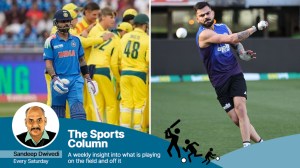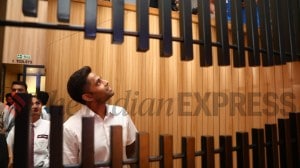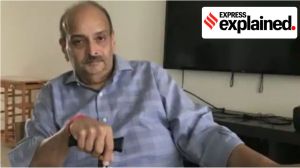Click here to follow Screen Digital on YouTube and stay updated with the latest from the world of cinema.
Kalki Koechlin performs Wo-Manologue: She’s Everywoman
Kalki Koechlin on her solo performance, Wo-Manologue, biking with her father and learning to play mother.
 Kalki Koechlin’s solo Wo-Manologue, where she plays herself, is a monologue on gender politics. (Source: PTI Photo)
Kalki Koechlin’s solo Wo-Manologue, where she plays herself, is a monologue on gender politics. (Source: PTI Photo)
Here, we are/ we’ve survived this far/ thanks to seduction/ perhaps a little manipulation/ but mostly thanks to Mother Nature/ and ovulation.
Two hundred women gathered in the chandeliered hall of The Lalit burst into applause as Kalki Koechlin addressed them directly in her monologue, called Wo-Manologue. She was performing a piece that addresses gender politics for the Young FICCI Ladies Organisation in Delhi on Monday morning. The solo, in which the actor plays herself, reflected the inferior position of women from the time of creation and travelled, in a few short lines, through religious history and world mythology until it arrived at the present, where patriarchy asserts itself in the way women dress, eat and speak.
The performance is structured like a chat in which the actor never gets out of her chair and uses natural and minimal gestures, keeping even the dramatic out of her voice. Koechlin’s oeuvre can be neatly split into two. On one side of the pendulum is the intensity of the film Margarita with a Straw, in which she played a sexually-active girl with cerebral palsy. On the other, are short and catchy performances made for the social-media generation. Wo-Manologue occupies the latter category alongside a YouTube video, known as It’s Your Fault, which went viral in 2013. Excerpts from an interview with the actor :
Wo-Manologue talks about women’s place but without digging too deep, as if leaving gaps for audiences to fill up with their own experiences. Why did you choose only to skim the surface?
This is a kind of poetry that transfers into a performance. It deals with a relevant subject, but it is short. Today’s generation likes things that can be shared on social media platforms. It was meant to trigger people into thinking. I like the discussions that follow the show. People feel aware, they keep the conversations going and talk about things that make me think.
How important is social media in the dissemination of politically-conscious artwork?
Social media allows us to break the formality of a subject and make it relevant for a youthful person. If you are in a car, stuck in traffic, you don’t want heavy discourses. You want something that makes you laugh. We need to find ways to reach people and popular culture is a way to do that. I would love to develop songs, more short videos with humour and have poetry slamming.
A raging issue about women involves motherhood. You are playing a mother in your next film.
The film is called Ribbon and it is by Rakhee Sandilya, who made a documentary on surrogate mothers called My Baby Not Mine. Ribbon is about the hardship of bringing up a child and talks about women in the workplace, maternity leaves and similar issues. There are only two characters in the film, a couple, and Sumeet Vyas is playing my husband. I spent an entire Sunday with a 16-day-old baby, changing nappies and trying to connect with her.
You also have a TV series coming up in which you travel through the Northeast with your father.
It is called Kalki’s Great Escape and will start airing on September 17. It is basically about my father, Joel Koechlin, and me travelling through Arunachal Pradesh, Assam and Meghalaya on bikes. Our idea was to make the show spontaneous and raw; it is not glamourous and is more about connecting with people and having interesting experiences.
Does the show break the stereotype of women, who are seen more as pillion riders, than bikers in their own right?
There is almost no visibility of women riding bikes. I learnt to ride as a teenager growing up in Pondicherry. When I was up in the Northeast, so many girls came up to us and were curious and excited about the bikes and wanted to get on it. I thought that was rather cool that so many women were interested in bikes.





- 01
- 02
- 03
- 04
- 05






























